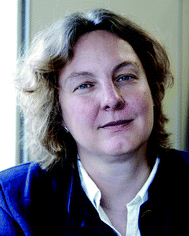Sabeth Verpoorte
Abstract
Lab on a Chip profiles new Editorial Board member Professor Sabeth Verpoorte
 Professor Sabeth Verpoorte heads the Pharmaceutical Analysis Group, which forms part of the Groningen Research Institute of Pharmacy (GRIP), University of Groningen, The Netherlands. She has more than sixteen years of research experience in the lab-on-a-chip field, starting in 1990 as a postdoctoral researcher and later as staff research scientist in the μTAS group headed by Professor Andreas Manz at Ciba Ltd., Basel, Switzerland. In July 1996 she assumed the position of team leader in the group of Professor Nico F. de Rooij at the Institute of Microtechnology (IMT), University of Neuchâtel, Switzerland, where her research interests concentrated on the lab-on-a-chip area for bioanalytical and environmental applications. She successfully led a research team of 8 PhD students and researchers while at IMT. In May 2003 Sabeth Verpoorte assumed the Chair of Analytical Chemistry and Pharmaceutical Analysis at GRIP, at the University of Groningen, The Netherlands. She has over 60 peer-reviewed papers and is involved in several international conference organizations.
Professor Sabeth Verpoorte heads the Pharmaceutical Analysis Group, which forms part of the Groningen Research Institute of Pharmacy (GRIP), University of Groningen, The Netherlands. She has more than sixteen years of research experience in the lab-on-a-chip field, starting in 1990 as a postdoctoral researcher and later as staff research scientist in the μTAS group headed by Professor Andreas Manz at Ciba Ltd., Basel, Switzerland. In July 1996 she assumed the position of team leader in the group of Professor Nico F. de Rooij at the Institute of Microtechnology (IMT), University of Neuchâtel, Switzerland, where her research interests concentrated on the lab-on-a-chip area for bioanalytical and environmental applications. She successfully led a research team of 8 PhD students and researchers while at IMT. In May 2003 Sabeth Verpoorte assumed the Chair of Analytical Chemistry and Pharmaceutical Analysis at GRIP, at the University of Groningen, The Netherlands. She has over 60 peer-reviewed papers and is involved in several international conference organizations.Research in the Groningen group focuses on the development of new analytical approaches for pharmaceutical analysis and the life sciences in general, by combining state-of-the-art lab-on-a-chip technologies with biochemistry and cell biology. Surface engineering and fundamental studies of the unique transport properties in microfluidic systems are of interest, as is the realization of biological assays at the few cell/few molecule scale. A clean lab with built-in air filtering to Class 10![[thin space (1/6-em)]](https://www.rsc.org/images/entities/char_2009.gif) 000 was recently put into operation for the rapid prototyping of microfluidic devices in glass, silicon, and various polymers (replication molding, hot embossing).
000 was recently put into operation for the rapid prototyping of microfluidic devices in glass, silicon, and various polymers (replication molding, hot embossing).
Ongoing projects include the development of advanced tools for cell analysis in conjunction with drug screening (chip-based human endothelial cell culture and analysis; development of an intestine–liver chip for ADME-Tox screening). To provide an improved technological base for these and similar applications, work is being carried out on the integration of pumping and valving into multi-channel and microchamber structures. In addition, the coupling of microfluidic devices to mass spectrometers is being implemented. On the more fundamental side, a flow-based electrokinetic technique to manipulate and separate polymer microspheres and biological particles (e.g. cells, DNA) is being investigated, as is the generation of electrosprays in two-phase liquid microsystems.
The group now numbers 12, including a tenure-track assistant professor, Dr Sander Koster, and 5 PhD students.
| This journal is © The Royal Society of Chemistry 2007 |
